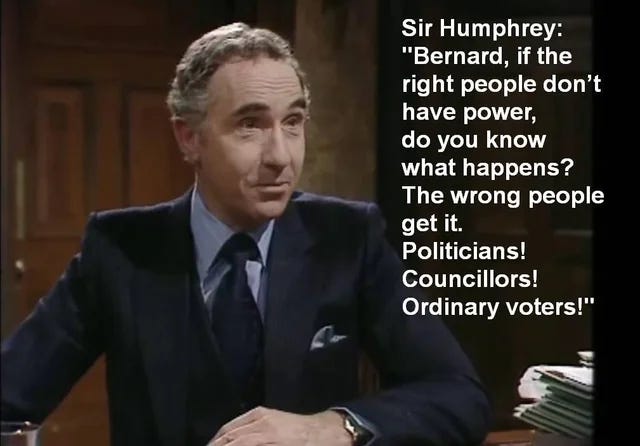Shades of Gray: Adaptive Psychopathy in Politics and Religion
The Adaptive Potential of Psychopathic Traits - continued
This is part two of my exploration of ‘adaptive psychopathy,’ a concept pioneered by Dr. Kevin Dutton. Part one is available here. I’ll be exploring two more high-stakes professions where Dutton’s “Seven Deadly Wins” can initially lead to success but also hold the seeds of destruction if not matched with ethics and appropriate restraint.
In Politics - The Operators
Richard Nixon's presidency remains one of the most controversial and studied periods in American history. His leadership and personality exhibited traits that align with several of the "Seven Deadly Wins," making his rise to power, subsequent achievements, and eventual downfall a subject of enduring fascination and debate.
Nixon’s political journey, a tapestry of ambition and controversy, was significantly shaped by three of the “Seven Deadly Wins” which both propelled him to the heights of power and precipitated his dramatic fall:
Ruthlessness: Nixon's political manoeuvres often reflected a ruthless streak, especially visible in his aggressive campaign tactics, such as the infamous “dirty tricks.” While this uncompromising approach helped him ascend the political ladder, it also laid the groundwork for his eventual downfall. The ruthlessness that once secured his victories morphed into a paranoid and unethical quest to retain power at all costs. This culminated in the Watergate scandal, where his administration’s involvement in the break-in at the Democratic National Committee headquarters was an extreme, but logical, extension of the same ruthless tactics he had long employed.
Fearlessness: Nixon’s boldness in foreign policy, exemplified by his opening to China and détente with the Soviet Union, showcased his capacity to confront entrenched geopolitical dynamics. However, this same fearlessness translated into a disregard for legal and ethical boundaries at home. His willingness to push limits without fear led to reckless decisions, like the authorization of illegal activities during the Watergate scandal, under the misguided belief that the end would justify the means.
Charm: Nixon's ability to connect with the public was a double-edged sword. His charm and persuasive rhetoric, which were instrumental in his electoral victories, also created a façade that masked his administration's unethical activities. However, as the Watergate scandal unfolded, this charm dissipated. His public addresses and speeches, once platforms for persuasion, became tools for denial and evasion, eroding the public trust he had worked hard to build.
Nixon’s downfall can be largely attributed to these same traits which, unchecked and combined with a lack of ethical restraint, led to decisions that were not only morally questionable but also legally indefensible. The Watergate scandal eventually led to his resignation - a first in U.S. presidential history. It starkly illustrated how the very traits that can fuel a leader’s rise can also, when taken to extremes, hasten their fall. Nixon's presidency thus serves as a cautionary tale of the delicate balance between ambition and ethical leadership.
In Fiction: Sir Humphrey Appleby
Sir Humphrey Appleby, a character from the British TV series "Yes Minister" offers a nuanced and satirical exploration of political manoeuvring within the framework of the "Seven Deadly Wins." While Humphrey's actions in the series are fictional and often exaggerated for comedic effect, they provide a stark contrast to Nixon's real-life political journey, particularly in how both figures embody similar traits but with different outcomes:
Ruthlessness: Like Nixon, Sir Humphrey exhibits a form of ruthlessness, though his is cloaked in bureaucracy and eloquence. Unlike Nixon's overt aggressive tactics, Humphrey's subtlety lies in his mastery of the civil service's labyrinth. He manoeuvres behind the scenes, using policy and procedure to outwit opponents and advance his agenda. This indirect approach allows him to maintain a veneer of respectability and avoid the pitfalls of Nixon's more blatant strategies.
Fearlessness: Humphrey's fearlessness is less about bold geopolitical moves and more about daring to navigate and manipulate the intricate system of government. He challenges norms and pushes boundaries within the confines of the civil service. However, unlike Nixon, Humphrey's actions rarely cross ethical lines into illegal territory. His audacity is balanced by a keen awareness of the limits within which he operates, preventing the kind of overreach that led to Nixon's downfall.
Charm: The charm of Sir Humphrey is less about public persuasion and more about influencing those within the corridors of power. He uses his wit, eloquence, and deep understanding of bureaucratic language to steer decisions in his favour. This charm, combined with his professional demeanour, enables him to mask his manipulations effectively. Unlike Nixon, whose charm diminished under public scrutiny during Watergate, Humphrey's charm flourishes in the shadows of government, allowing him to maintain his influence without attracting negative attention.
Sir Humphrey's portrayal in "Yes Minister" demonstrates how the same traits that brought Nixon to power and led to his downfall can be wielded differently. Humphrey's more subtle and cautious approach to the "Seven Deadly Wins" enables him to navigate the treacherous waters of politics without succumbing to the same fate as Nixon. While both figures exemplify strategic thinking, charm, and ruthlessness, Sir Humphrey's character shows that how these traits are applied can significantly alter their outcomes. His ability to employ these characteristics without crossing into unethical or illegal territory illustrates a different, albeit fictional, pathway in the use of power and influence within political spheres.
In Religion - The Evangelists
Jimmy Swaggart's narrative in the world of televangelism presents a fascinating case study in the context of Dutton's "Seven Deadly Wins." His rise and fall also epitomize the double-edged sword of these traits.
Charm: Swaggart's magnetic personality was a cornerstone of his appeal. His dynamic preaching style and heartfelt gospel music connected deeply with his audience, propelling his televangelist programs to extraordinary popularity. This charm, an asset in amassing a vast following, also veiled his personal indiscretions, masking the duality of his public persona and private failings.
Persuasiveness: His powerful oratory skills and ability to articulate religious convictions were pivotal in establishing his authority and credibility in the evangelical community. This persuasiveness, while instrumental in building his empire, also heightened the sense of betrayal felt by his followers when his moral failings came to light.
Focus: Swaggart's unwavering conviction and dedication to his cause were evident in his sermons and religious pursuits. However, this intense focus, when misdirected, contributed to a tunnel vision that overlooked the ethical implications of his actions, leading to his public and humiliating downfall.
In 1988, Swaggart's teary confession, “I have sinned against you, my Lord,” highlighted his persuasive power even in moments of personal crisis. Yet, in 1991, his defiant response, "The Lord told me it's flat none of your business," showed a stark contrast, revealing a complex interplay of charm, persuasion, and focus that both elevated and endangered his career.
Swaggart's story is a telling example of how the traits that can catalyse a leader's rise can also, when unchecked, lead to their fall. His journey underscores the need for ethical grounding and personal accountability in leadership, especially in a sphere as influential as religious broadcasting.
In Fiction: The Righteous Gemstones
The HBO series "The Righteous Gemstones" offers a fictional yet incisive portrayal of a televangelist family that mirrors some aspects of Swaggart's life, providing a satirical exploration of the "Seven Deadly Wins."
Ruthlessness: The Gemstone family's narrative is rife with instances of ruthless behaviour, often justified under the guise of religious and familial loyalty. This cut-throat attitude, while securing their status and wealth, also sows the seeds of internal and external conflict, reflecting the perilous consequences of unchecked ambition in religious leadership.
Manipulation: A key theme in the series is the manipulation of religious belief for personal gain. The Gemstones adeptly use their influence and authority to sway their congregation, echoing the persuasive power seen in real-life televangelists. This manipulation, while effective in achieving their goals, often leads them into morally ambiguous, if not outright unethical, territory.
Dichotomy of Public and Private Persona: The series sharply contrasts the public facade of piety and charisma displayed by the Gemstone family with their private vices and conflicts. This dichotomy underscores the complex interplay between public image and personal integrity, a theme resonant in many real-life scenarios of religious leaders.
"The Righteous Gemstones," through its fictional lens, parallels real-world instances like Swaggart's fall, highlighting the intricate dynamics of power, morality, and leadership in the realm of televangelism. Both narratives serve as compelling illustrations of how traits like charm, persuasiveness, and focus can be both a blessing and a curse in the high-stakes world of religious influence.
The Gendered Lens of Adaptive Psychopathy
In this exploration of adaptive psychopathy within high-stakes professions, a notable pattern has emerged: a preponderance of male examples. This raises an important discussion on the gendered perception of traits such as ruthlessness, fearlessness, and charm. Particularly, how do these perceptions shift when these traits are manifested in women?
In male-dominated fields, from politics to corporate leadership, such traits are often viewed as strengths, even if they are critiqued. For women, however, exhibiting these same characteristics frequently results in a different societal response. Women are often held to contrasting standards, where the demonstration of such traits can lead to negative labelling and unfair criticism. This disparity is vividly illustrated in the cases of Margaret Thatcher and Elizabeth Holmes.
Margaret Thatcher, the first female Prime Minister of the United Kingdom, often displayed formidable ruthlessness and fearlessness. Yet, these very traits, which might have been lauded in a male leader, were frequently used to criticize and undermine her, with terms like the 'Iron Lady' encapsulating both respect and derision. Elizabeth Holmes, the founder of Theranos, similarly displayed a relentless drive and boldness akin to figures like Steve Jobs. However, as her narrative unfolded, these traits were seen less as marks of a visionary and more as characteristics of deceit and unethical behaviour that lead to convictions on multiple counts of fraud.
These two examples underscore the complex choices faced by women with these traits:
Concealment: Hiding these traits may seem a safer path, aligning with traditional expectations of femininity. However, this often leads to underutilization of their full potential.
Muted Expression: Employing these traits in a more covert or socially acceptable manner is another strategy, though it might limit the visibility of their leadership qualities.
Defiance: Openly displaying these characteristics can bring success but also harsher scrutiny and sexist criticism compared to their male counterparts.
This gendered double standard in the perception of adaptive psychopathy traits is not just a matter of individual choices but reflects broader societal biases. To fully embrace the potential of leaders, irrespective of gender, we need to dismantle these stereotypes. This involves not only recognizing and appreciating traditionally 'masculine' traits in women but also valuing traditionally 'feminine' qualities in men.
In Conclusion
In wrapping up our deep dive into the world of adaptive psychopathy in high-stakes professions, it's clear that traits like ruthlessness, charm, and fearlessness aren't just for villains in a blockbuster. Dr. Kevin Dutton’s research has given us much to ponder about their potential perks. But it is crucial to recognize that there is a fine line between a cool-headed CEO and a cold-hearted one.
The real trick? Not getting carried away. Celebrating these traits without caution is like giving a teenager the keys to a sports car and saying, "Have fun, but be careful." We need to be vigilant to ensure that our admiration for these traits doesn't accidentally slide into a free pass for ethical slip-ups.
In the high-stakes corridors of power – from the operating room to the boardroom – these traits need to be matched with the softer skills of empathy and ethics. Imagine a workplace where the go-getter's drive is matched by their moral compass – that's the sweet spot.
So, what's the takeaway for the rest of us? It's about striking a balance. In a world that often celebrates the bold and the brash, let's not forget the virtues of the thoughtful and the considerate. After all, the best leaders might just be those who know when to dial up the charm and when to lead with compassion.
In essence, our journey through the adaptive side of psychopathy teaches us that while these traits can indeed open doors to success, they should come with a 'handle with care' label. It's about using these powers for good – and maybe, just maybe, keeping an eye out so they don't end up steering us down the wrong path.
Comments are open to all on this post.







